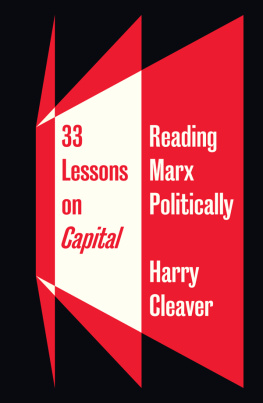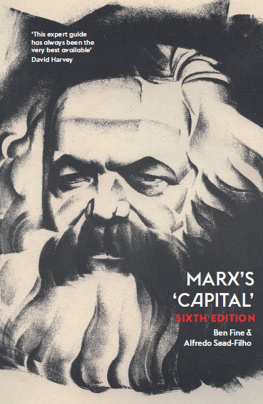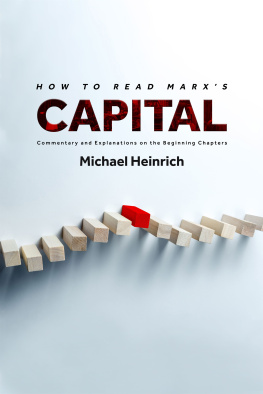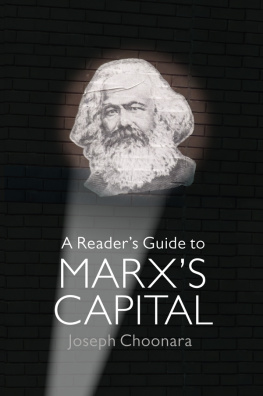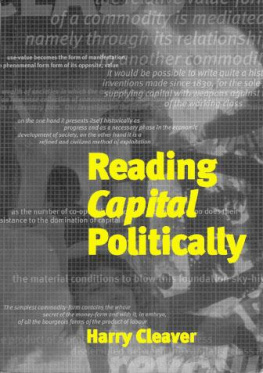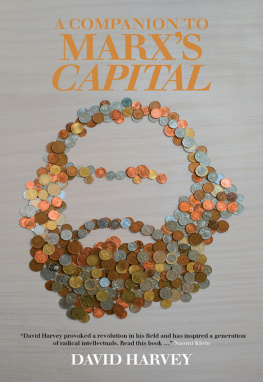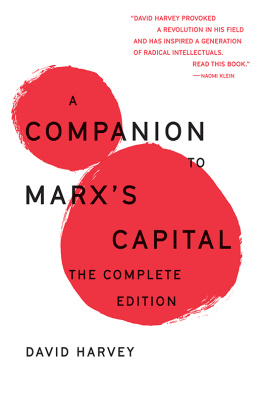Harry Cleaver - 33 Lessons on Capital: Reading Marx Politically
Here you can read online Harry Cleaver - 33 Lessons on Capital: Reading Marx Politically full text of the book (entire story) in english for free. Download pdf and epub, get meaning, cover and reviews about this ebook. year: 2019, publisher: Pluto Press (UK), genre: Politics. Description of the work, (preface) as well as reviews are available. Best literature library LitArk.com created for fans of good reading and offers a wide selection of genres:
Romance novel
Science fiction
Adventure
Detective
Science
History
Home and family
Prose
Art
Politics
Computer
Non-fiction
Religion
Business
Children
Humor
Choose a favorite category and find really read worthwhile books. Enjoy immersion in the world of imagination, feel the emotions of the characters or learn something new for yourself, make an fascinating discovery.
- Book:33 Lessons on Capital: Reading Marx Politically
- Author:
- Publisher:Pluto Press (UK)
- Genre:
- Year:2019
- Rating:4 / 5
- Favourites:Add to favourites
- Your mark:
- 80
- 1
- 2
- 3
- 4
- 5
33 Lessons on Capital: Reading Marx Politically: summary, description and annotation
We offer to read an annotation, description, summary or preface (depends on what the author of the book "33 Lessons on Capital: Reading Marx Politically" wrote himself). If you haven't found the necessary information about the book — write in the comments, we will try to find it.
33 Lessons on Capital: Reading Marx Politically — read online for free the complete book (whole text) full work
Below is the text of the book, divided by pages. System saving the place of the last page read, allows you to conveniently read the book "33 Lessons on Capital: Reading Marx Politically" online for free, without having to search again every time where you left off. Put a bookmark, and you can go to the page where you finished reading at any time.
Font size:
Interval:
Bookmark:

Thirty-Three Lessons on Capital
Reading Marx Politically
Harry Cleaver

First published 2019 by Pluto Press
345 Archway Road, London N6 5AA
www.plutobooks.com
Copyright Harry Cleaver 2019
The right of Harry Cleaver to be identified as the author of this work has been asserted by him in accordance with the Copyright, Designs and Patents Act 1988.
Every effort has been made to trace copyright holders and to obtain their permission for the use of copyright material in this book. The publisher apologises for any errors or omissions in this respect and would be grateful if notified of any corrections that should be incorporated in future reprints or editions.
British Library Cataloguing in Publication Data
A catalogue record for this book is available from the British Library
ISBN 978 0 7453 3998 6 Hardback
ISBN 978 0 7453 3997 9 Paperback
ISBN 978 1 7868 0514 0 PDF eBook
ISBN 978 1 7868 0516 4 Kindle eBook
ISBN 978 1 7868 0515 7 EPUB eBook
This book is printed on paper suitable for recycling and made from fully managed and sustained forest sources. Logging, pulping and manufacturing processes are expected to conform to the environmental standards of the country of origin.
Typeset by Stanford DTP Services, Northampton, England
Chapters 2633
Chapters 13
Chapters 46
Chapters 711
Chapters 1215
Chapters 1618
Chapters 1922
Chapters 2325
First, and most profoundly, to all of my students who truly engaged with Marxs Capital and with the interpretations I offered in lectures, my online study guide and informal discussions. Their questions and challenges helped both them and me think more clearlyespecially when they turned my attention to things I hadnt thought about before.
Second, I also want to thank friends who read some of the material in this book as it was being crafted and gave me constructive and useful feedback, including ideas and editing, both of which improved the text considerably. These included Brett Caraway, Robert Ovetz and especially my brother William Cleaver.
The primary source materials for this book are Volume I of Capital, translated by Ben Fowkes and published by Penguin Press and the now completed 50 volumes of Karl Marx Frederich Engels Collected Works (MECW), published by Progress Publishers, Moscow, Lawrence & Wishart, London and International Publishers in New York. The 33 analyses of the 33 chapters of Volume I that I offer here only engage to a very limited degree with a number of other important theoretical works now available in English: 1) the prefaces written by Marx and Engels to various editions of Capital; 2) the unpublished 6th Chapter, available in the Penguin edition of Volume I as an appendix, titled Results of the Immediate Process of Production; 3) the second and third volumes of Capital; 4) the intended fourth volume, edited and published by Karl Kautsky (18541938) after Marxs death as Theories of Surplus Value (186163); and 5) various other manuscripts composed in the years before Volume I was prepared for publication, such as the 1844 Manuscripts, the Grundrisse (1857), the Contribution to the Critique of Political Economy (1859) and the draft of Volume III included in the Manuscript of 18641865.
Quoted and cited material from Capital, Volumes IIII and the Grundrisse are all from the Penguin editions of those works, because I assume them to be more readily available to most readers than the volumes of MECW. Most other citations of writings by Marx and Engels are to MECW. References to the Penguin editions just give their title and page number, e.g., Capital, Vol. I, p. xxx, whereas MECW references provide volume and page numbers. In some cases, references are given to both editions. Because the translations in these two editions are different, fastidious readerswith the time and inclinationmight want to compare the two. They might also check www.marxist.org for other translations from other sources. Some of the difficulties in the various English translations have recently been pointed out by Wolfgang Fritz Haug in his On the Need for a New English Translation of Marxs Capital, Socialism and Democracy, vol. 31, no. 1, January 2017, pp. 6086. Those who can read French might want to study the translation in that language of Volume I of Capital, revised by Marx from the German original. Those who can read German can consult Marx-Engels-Gesamtausgabe (MEGA), the largest published collection of Marx and Engelss writings and one that reproduces them in their original languages. The collection is still expanding under the stewardship of the Internationale Marx-Engels-Stiftung (IMES) in Amsterdam. For more information on MEGA, see its entry in Wikipedia.
Many of the songs cited herein are available on YouTube. Lyrics are quoted from the following:
The 6th Sense (Something You Feel), by Albert Johnson, Lonnie Rashid Lynn, Chris E. Martin, Kejuan W. Muchita and Bilal S. Oliver 2000 Juvenile Hell Publ./Universal Music-MGB Songs.
9 to 5, by Dolly Parton, 1980 Velvet Apple Music/Warner-Tamerlane Pub.
The Big Money, by Neil Peart, Alex Lifeson and Geddy Lee 1985 Core Music Publishing/Anthem Entertainment Group.
Commercialization, by Jimmy Cliff 1973 Jimmy Cliff.
Corrido de Delano, by Lalo Guerrero 1966 Lalo Guerrero.
Factory, by Bruce Springsteen 1978 Bruce Springsteen.
The Great Eel Robbery, by Men of No Property 1971 Men of No Property.
I Dont Like Mondays, by Bob Geldof and Johnnie Fingers 1979 Music Sales Corp.
Machines, by Lol Mason, Michael Chetwynd Slamer and Terence Roy Ward 1979 Atlantic Recording Corporation.
Maggies Farm, by Bob Dylan 1965 Bob Dylan.
Magnificent Seven, by Mick Jones, Joe Strummer, Topper Headon, Norman Watt-Roy and Micky Gallagher 1980 Nineden Ltd.
Money, by Roger Waters 1973 Pink Floyd Music Publishers Ltd./Hampshire House Publishing Corp.
Money Machine, by James Taylor 1978 Country Road Music Inc.
Nine to Five, by Ray Davies 1974/75 Sony/ATV Tunes LLC.
Piss Factory, by Patti Smith and Richard Sohl 1974 Druse Music Inc.
Rain on the Scarecrow, by John Cougar Mellencamp 1985 John Mellencamp.
Richard Cory, by Paul Simon 1965 Paul Simon Music.
Rush Hour Blues, by Ray Davies 1974/75 Sony/ATV Tunes LLC.
Seven Cent Cotton, by Bob Miller and Emma Dermer 1929 Bob Miller and Emma Dermer.
Step Right Up, by Tom Waits 1976 Elektra/Asylum/Nonesuch Records.
Welcome to the Working Week, by Elvis Costello 1977 Universal Music Publishing.
Introduction
Thirty-three lessons on the 33 chapters of Volume I of Karl Marxs Capital. What?! Yet another book on Capital? Why read this one, among so many? Well, if you are looking for a scholarly text that interprets Capital as a work of economics or philosophy, this one is probably not for you. If you are seeking an interpretation designed to justify some partisan political platform, skip this one. If you need a philological treatise that draws on all editions and translations, look elsewhere. But, if you want to discover how what Marx wrote 150 years ago can help us understand our struggles and figure out what to do next, then this particular appropriation might provide some of what you are looking for.
Font size:
Interval:
Bookmark:
Similar books «33 Lessons on Capital: Reading Marx Politically»
Look at similar books to 33 Lessons on Capital: Reading Marx Politically. We have selected literature similar in name and meaning in the hope of providing readers with more options to find new, interesting, not yet read works.
Discussion, reviews of the book 33 Lessons on Capital: Reading Marx Politically and just readers' own opinions. Leave your comments, write what you think about the work, its meaning or the main characters. Specify what exactly you liked and what you didn't like, and why you think so.

